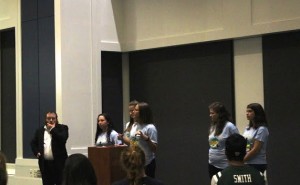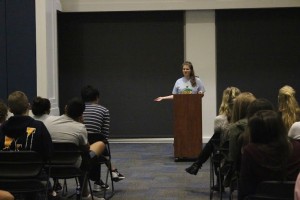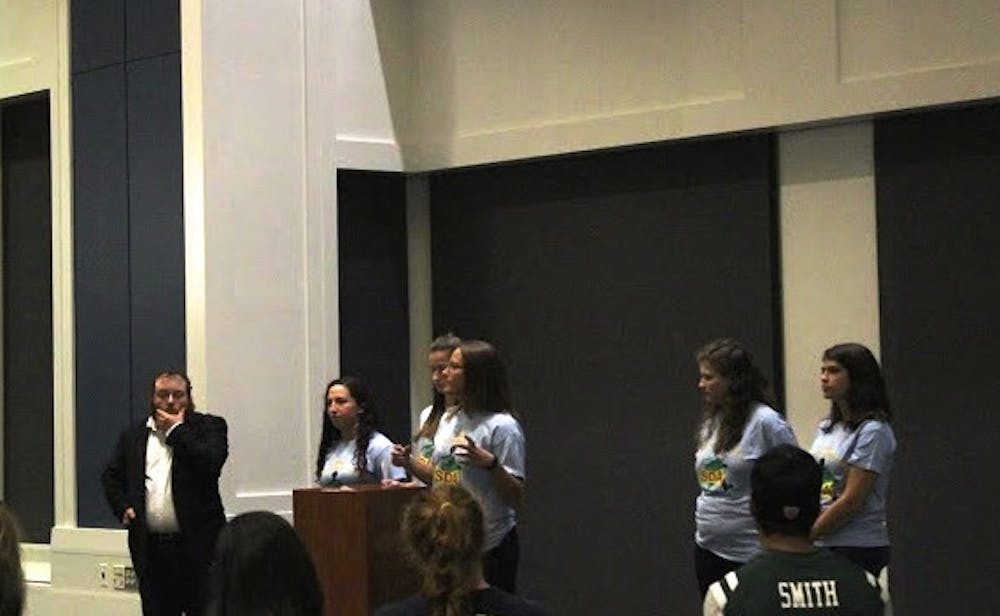By Alexa Kelber
Staff Writer
The word “disability” has historically been synonymous with a heavy, negatively annotated feeling of sympathy, and more often than not, genuine ignorance. The Students for Disabilities Awareness (SDA) held their second annual (dis)Ability Monologues on Tuesday, Oct. 6 in the Education Building to challenge these fundamental misconceptions.

Junior special education and psychology major Christine Breverin, SDA’s president, described how individuals living with disabilities could offer different perspectives by telling personal stories.
“We want to take the ‘dis’ out of ‘disability,’” Breverin said. “We want to bring awareness to harmful social and medical constructs and show that, from a different perspective, aspects of disabilities can actually be cool.”
SDA created a space to talk about the triumphs of overcoming adversities, rather than focusing on the hardships. One of the most important takeaways from the event was that a disability does not define an individual as a person — it is merely something that they learn to live with, and in many cases, thrive with.
“Learning how to lead has helped me with my academics. I have so many opportunities that other people don’t have,” Shawna Dedonado, a freshman CCS student and a member of SDA said when asked how having a disability had a positive impact on her life. “I went to nationals three times in five years with DECA (a business leadership-oriented program) when I was in high school.
“Wow, I kind of sound like my mom,” she added.
Daniel Lapidow, a senior CCS student and the disabilities chair of SDA, offered his own thoughts in his speech titled, “A Day Without Dyslexia.” He fantasized about going to see a foreign movie that only had subtitles, as well as commenting on his favorite YouTube videos. He humorously added how he would “pick up ‘Twilight,’ but then throw it down because it would be a waste of his day without dyslexia.”
Despite the difficulties that come along with having a reading disorder, Lapidow’s outlook was more than positive — his comfortability with himself was obvious.
“I thank dog... I mean God... everyday that I’m a person with dyslexia,” Lapidow said.
Muscular dystrophy is the disability that Mark Eisenberg, a senior physics major, lives with.
“Your muscles get really weak over time, and it’s gradual,” Eisenberg said. “People have this idea that I’ve been in a wheelchair my entire life. I was born perfectly fine, but as I grew up, I started having trouble on the jungle gym.”

It got to the point where “a breeze would blow” and it felt like he would be knocked over.
His journey to college taught him not to be ashamed of asking for help, as well as other important life lessons.
“Live in the present. Spend time thinking about what you’re grateful for to make the bad things seem less bad,” Eisenberg said.
Members of SDA normalized the idea of having a disability by citing celebrities who live with one — Michael J. Fox acts with Parkinson’s, Stephen Hawking educates with ALS, Tim Tebow plays football with dyslexia and Michael Phelps swims with ADHD.
Perhaps the most moving speaker was someone who did not appear to have a disability at all. A junior psychology and public health double major, Aditi Mahapatra lives with vasculitis, a systemic disease caused by the inflammation of blood vessels. The disease causes poor blood flow to the body. As a result, the person can suffer from shortness of breath, numbing in the hands or feet and sores on the skin. She is living, breathing proof that seeing somebody on the surface is only a fraction of their reality.
Onlookers would not suspect that she almost lost her life last summer.
Mahapatra had a severe sinus affection which was antibiotic resistant — she couldn’t get better. She had a PICC line put in so she could receive intravenous antibiotics. The PICC line, with a direct route to her heart, got infected spread to her bloodstream (sepsis). She was critically ill, but still remained positive.
“My favorite is when people tell me to be positive, like positivity will make my illness go away,” Mahapatra said. “Human beings have the tendency to think they know everything, but it’s not something they can understand unless they experience it for themselves.
“Despite the daring adventures I’ve been drafted for, I love life,” she said. “I’m a normal college student with a little extra baggage.”
For someone dealing with such afflictions, her advice was simple: “Be compassionate. Be kind. Be kind because everyone you know could be fighting a hard battle. Be kind because it’s not worth it to be unkind.”
SDA has embarked on an endeavor to promote appreciation and understanding of these disorders and alter the stigma attached to (dis)abilities. If their success could be gauged by the impact of these courageous speakers, they are on the trajectory to achieve their goals.







